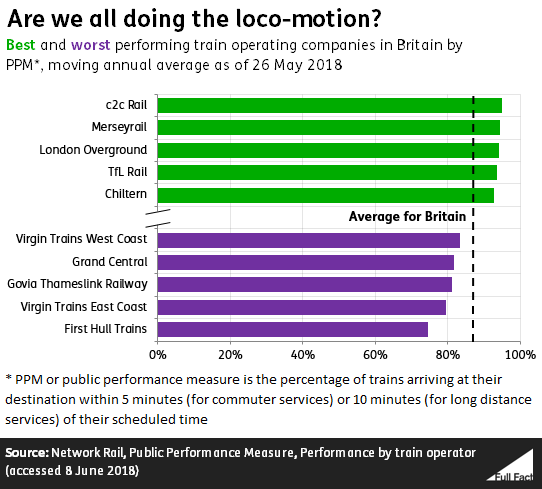What was claimed
The trains don’t run on time.
Our verdict
Around 87% of trains in Britain arrived at their destination within five or 10 minutes of their schedule, in the year to May 2018. Around 62% arrived within a minute of their schedule.
What was claimed
The trains don’t run on time.
Our verdict
Around 87% of trains in Britain arrived at their destination within five or 10 minutes of their schedule, in the year to May 2018. Around 62% arrived within a minute of their schedule.
What was claimed
Rail fares are out of control.
Our verdict
The average rail fare in Britain has increased by 20% in real terms since 1995, though it dropped by 1%, factoring in inflation, between 2017 and 2018.
“The prices are out of control, the trains don’t run on time”.
Baroness Shami Chakrabarti, 7 June 2018
Join 72,953 people who trust us to check the facts
Sign up to get weekly updates on politics, immigration, health and more.
Subscribe to weekly email newsletters from Full Fact for updates on politics, immigration, health and more. Our fact checks are free to read but not to produce, so you will also get occasional emails about fundraising and other ways you can help. You can unsubscribe at any time. For more information about how we use your data see our Privacy Policy.
Train punctuality has been falling generally for the past five years, across several measures.
Around 87% of trains in Britain arrived at their destination on time in the year to 26 May 2018, according to one measure from Network Rail.
“On time” in this case doesn’t mean the exact time on the timetable though. This is based on the ‘public performance measure’ (or PPM) which is an industry standard throughout Europe. It counts “on time” to mean “trains arriving at their terminating station within five minutes for commuter services and within 10 minutes for long distance services” of the timetable agreed with Network Rail at 10pm the night before.
The worst performer on this measure was First Hull Trains as around 75% of its trains arrived on time over the year. The best performer was c2c Rail—which runs services through Essex—with 95% of its trains arriving on time.

Another measure looks at whether a train arrives at its destination within 59 seconds of the scheduled time. This is know as ‘right-time performance’. Looked at this way around 62% of trains were on time in the year to 26 May 2018.
Neither measure will necessarily reflect your own experience of the railways—if you get off before a train reaches its final destination, for example, this leg isn’t picked up directly in these figures. There may also be variations depending on whether you travel at peak and off-peak times.
The worst performer using this measure was again First Hull Trains, only 22% of it’s trains arrived on time. The best performer was Arriva Trains Wales, with 83% of trains on time.
One other measure has shown a similar trend: over the last five years the proportion of trains that have been cancelled or ‘significantly late’ (usually when a service arrives over 30 minutes late) has generally been increasing, although this has fallen in the last year. In the year to May 2018 around 4% of trains in England and Wales were cancelled or significantly late.
The average ticket price in Britain increased by over 20%, once you factor in inflation, between 1995 and 2018.
The price of first class tickets has increased the most (55%), followed by unregulated standard class tickets (28%) and regulated standard class tickets (5%).
Regulated standard class ticket fares can only increase by a certain amount each year (in 2018 it was 3.6%). This includes tickets like saver returns, standard returns and weekly season tickets as well as certain commuter fares in and around the London area.
In the short-term rail fares have fallen by 1% on average over the last year, once you factor in inflation.
Of course these figures will vary by train operator and across the country, so won’t reflect the experience of all passengers.
Full Fact fights for good, reliable information in the media, online, and in politics.
Bad information ruins lives. It promotes hate, damages people’s health, and hurts democracy. You deserve better.
Subscribe to weekly email newsletters from Full Fact for updates on politics, immigration, health and more. Our fact checks are free to read but not to produce, so you will also get occasional emails about fundraising and other ways you can help. You can unsubscribe at any time. For more information about how we use your data see our Privacy Policy.